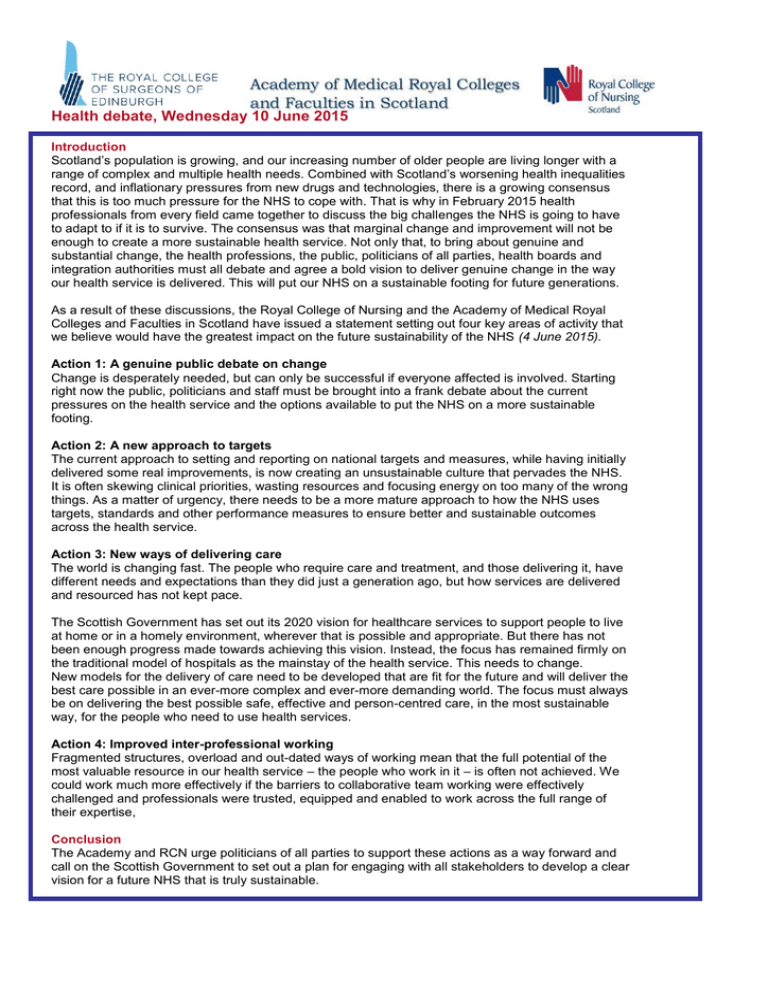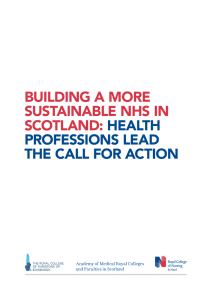Health debate, Wednesday 10 June 2015
advertisement

Health debate, Wednesday 10 June 2015 Introduction Scotland’s population is growing, and our increasing number of older people are living longer with a range of complex and multiple health needs. Combined with Scotland’s worsening health inequalities record, and inflationary pressures from new drugs and technologies, there is a growing consensus that this is too much pressure for the NHS to cope with. That is why in February 2015 health professionals from every field came together to discuss the big challenges the NHS is going to have to adapt to if it is to survive. The consensus was that marginal change and improvement will not be enough to create a more sustainable health service. Not only that, to bring about genuine and substantial change, the health professions, the public, politicians of all parties, health boards and integration authorities must all debate and agree a bold vision to deliver genuine change in the way our health service is delivered. This will put our NHS on a sustainable footing for future generations. As a result of these discussions, the Royal College of Nursing and the Academy of Medical Royal Colleges and Faculties in Scotland have issued a statement setting out four key areas of activity that we believe would have the greatest impact on the future sustainability of the NHS (4 June 2015). Action 1: A genuine public debate on change Change is desperately needed, but can only be successful if everyone affected is involved. Starting right now the public, politicians and staff must be brought into a frank debate about the current pressures on the health service and the options available to put the NHS on a more sustainable footing. Action 2: A new approach to targets The current approach to setting and reporting on national targets and measures, while having initially delivered some real improvements, is now creating an unsustainable culture that pervades the NHS. It is often skewing clinical priorities, wasting resources and focusing energy on too many of the wrong things. As a matter of urgency, there needs to be a more mature approach to how the NHS uses targets, standards and other performance measures to ensure better and sustainable outcomes across the health service. Action 3: New ways of delivering care The world is changing fast. The people who require care and treatment, and those delivering it, have different needs and expectations than they did just a generation ago, but how services are delivered and resourced has not kept pace. The Scottish Government has set out its 2020 vision for healthcare services to support people to live at home or in a homely environment, wherever that is possible and appropriate. But there has not been enough progress made towards achieving this vision. Instead, the focus has remained firmly on the traditional model of hospitals as the mainstay of the health service. This needs to change. New models for the delivery of care need to be developed that are fit for the future and will deliver the best care possible in an ever-more complex and ever-more demanding world. The focus must always be on delivering the best possible safe, effective and person-centred care, in the most sustainable way, for the people who need to use health services. Action 4: Improved inter-professional working Fragmented structures, overload and out-dated ways of working mean that the full potential of the most valuable resource in our health service – the people who work in it – is often not achieved. We could work much more effectively if the barriers to collaborative team working were effectively challenged and professionals were trusted, equipped and enabled to work across the full range of their expertise, Conclusion The Academy and RCN urge politicians of all parties to support these actions as a way forward and call on the Scottish Government to set out a plan for engaging with all stakeholders to develop a clear vision for a future NHS that is truly sustainable.



